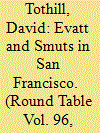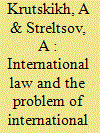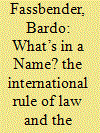|
|
|
Sort Order |
|
|
|
Items / Page
|
|
|
|
|
|
|
| Srl | Item |
| 1 |
ID:
077785


|
|
|
|
|
| Publication |
2007.
|
| Summary/Abstract |
This article compares the Australian H. V. Evatt and the South African J. C. Smuts as their countries' foreign ministers at the time when the United Nations Charter was drafted. It shows that Smuts, long considered a statesman of international stature, was less adept at the game of international politics UN-style than Evatt, a relative neophyte on the world stage
|
|
|
|
|
|
|
|
|
|
|
|
|
|
|
|
| 2 |
ID:
138054


|
|
|
|
|
| Summary/Abstract |
THE IMPACT of information and communication technologies (ICT) on all aspects of human life, society and the State cannot be overemphasized. Apart from the obvious benefits in terms of economic, social and cultural development, the enhancement of the role of ICT in the contemporary world inevitably brings new risks for international and national security. There is already real evidence that the damage from the use of ICT for purposes contrary to the Charter of the United Nations, as well as for criminal and terrorist purposes may be comparable to the most destructive weapons. The list of potential targets for information weapon attacks includes not only the information resources of the Internet, but also the critical infrastructures of States in the industry, transport and energy sectors. What's more, the scale and technological level of such destructive impact are steadily increasing.
|
|
|
|
|
|
|
|
|
|
|
|
|
|
|
|
| 3 |
ID:
082956


|
|
|
|
|
| Publication |
London, Stevens & Sons Ltd., 1951.
|
| Description |
xvii, 994p.
|
|
|
|
|
|
|
|
|
|
|
|
Copies: C:1/I:0,R:0,Q:0
Circulation
| Accession# | Call# | Current Location | Status | Policy | Location |
| 053696 | 341.23/KEL 053696 | Main | On Shelf | General | |
|
|
|
|
| 4 |
ID:
078901


|
|
|
| 5 |
ID:
142426


|
|
|
|
|
| Summary/Abstract |
The 70th anniversary of the signing and entry into force of the United Nations Charter provides a good moment to revisit the conditions under which Allied governments decided to establish the second generation of intergovernmental organization. The wartime commitments to defeating fascism and multilateralism made the establishment of the world organization a logical outgrowth of the wartime origins and the best guarantee of peace and prosperity. Ironically, the ideals of Immanuel Kant were found to be essential to the Hobbesian objective of state survival; multilateralism was a powerful strategy and not merely liberal window-dressing. That historical backdrop is complemented by two largely invisible variables from that time—the role of ideas and of non-state actors—which have since been driving change in the world organization. A future research agenda suggests ways to lift the UN from its current doldrums. Many of the debates and operational activities in the United Nations beginning in the 1970s reflected two topics—interdependence and the proliferation of actors—which profoundly affected what, since the 1990s, we have come to call ‘global governance’. On the positive side, these preoccupations helped us move towards a better understanding of a very complex world. On the downside, they also tend to celebrate unduly the ability of non-state actors and ignore the crucial role of intergovernmental organizations.
|
|
|
|
|
|
|
|
|
|
|
|
|
|
|
|
| 6 |
ID:
163439


|
|
|
|
|
| Summary/Abstract |
In the past twenty years or so, the concept of the rule of law, cherished for centuries as a constitutional principle in a domestic legal context, has attracted much attention from international lawyers and international organizations. In particular, the United Nations has devoted substantial effort and time to studying and defining the international dimension of the concept, to concretizing specific legal consequences, and to applying the concept to its own mandate and work, especially in the area of the maintenance of international peace and security. Against this background, the present article enquires into the relationship between the concept of an international rule of law as advanced by the United Nations and the UN Charter. To what extent can the concept be said to be inherent in the Charter, although the term itself does not appear in its text? Comparing the original design of the Charter with the rule of law as developed by the UN, the article observes a progressive expansion of the concept in several dimensions, but at the same time its persistent vagueness.
|
|
|
|
|
|
|
|
|
|
|
|
|
|
|
|
|
|
|
|
|